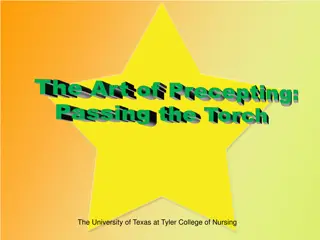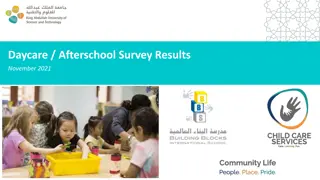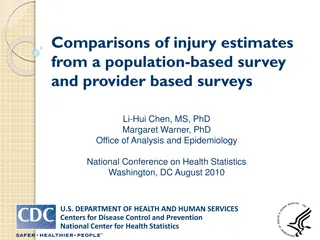Four Options Survey Initial Results by Tyler Lefevor, Ph.D. & Ron Schow, Ph.D.
Explore the findings of the Four Options Survey conducted by Tyler Lefevor, Ph.D., and Ron Schow, Ph.D. The survey delves into various aspects such as relationship status, mental health, satisfaction, and religion/spirituality, providing insights into the viewpoints and life directions of the participants. Discover the demographics of the survey takers and the intriguing questions posed by the survey.
Download Presentation

Please find below an Image/Link to download the presentation.
The content on the website is provided AS IS for your information and personal use only. It may not be sold, licensed, or shared on other websites without obtaining consent from the author.If you encounter any issues during the download, it is possible that the publisher has removed the file from their server.
You are allowed to download the files provided on this website for personal or commercial use, subject to the condition that they are used lawfully. All files are the property of their respective owners.
The content on the website is provided AS IS for your information and personal use only. It may not be sold, licensed, or shared on other websites without obtaining consent from the author.
E N D
Presentation Transcript
Four Options Survey Initial Results TYLER LEFEVOR, PH.D. RON SCHOW, PH.D.
Where are we going? What is the four options survey? Who took it? What did we find? Feedback Discussion Take-aways
Our purpose Present findings Practical applications Get feedback
What is the four options survey? 97 questions in 10 domains: single/relationship status, mental health, satisfaction, religion/spirituality Conducted pilot study (N=81) & collected phase I data (N=366) Outreach to diverse scholars for feedback Adversarial collaboration Represent their current viewpoint and direction of life? 17% moderately, 51% mostly, 15% fully (83% total)
Who took this survey? 24% 43% 23% 90% urban/suburban/metropolita n 9% Race/ethnicity Gender
Sexual Identity Gay/lesbian Bisexual SSA Other 41.20% 13.20% 37.80% 7.80% Who took this survey? 53.8% Mormon Single/relationship status Same-sex relationship Single, celibate Mixed orientation relationship Single, not celibate
Choose Your Adventure Is there a single/relationship status that makes people most satisfied? Do people in mixed orientation relationships feel more other-sex attraction than people in same-sex relationships or those who are single? What helps people feel satisfied in the life path they choose? Are there mental health differences between people who identify as LGBQ and from those who refer to themselves as same-sex attracted? Is being active in the LDS church helpful or harmful for sexual minorities? How do beliefs about sexuality impact mental health? And so many more
#1) IS THERE A SINGLE/ RELATIONSHIP STATUS THAT MAKES PEOPLE MOST SATISFIED?
#1) Four Single/Relationship Statuses Religious Orthodoxy Conservative Liberal Single and not celibate Single and celibate Single Coupling Mixed orientation relationship Same-sex relationship Partnered
#1) Single/Relationship Status Satisfaction SC SNC MOR SSR Very dissatisfied Dissatisfied 7% 10% 3% 1% 21% 22% 5% 1% Slightly dissatisfied Neutral 18% 18% 8% 2% 12% 10% 3% 2% Slightly satisfied Satisfied 13% 14% 16% 7% 23% 20% 37% 27% Very satisfied % Satisfied 6% 6% 28% 61% 42% 40% 80% 95% Mean Satisfaction 3.95 3.82 5.45 6.38
#2) DO PEOPLE IN MIXED ORIENTATION RELATIONSHIPS FEEL MORE OTHER-SEX ATTRACTION THAN PEOPLE IN SAME-SEX RELATIONSHIPS OR THOSE WHO ARE SINGLE?
#2) Sexual Attraction and Single/Relationship Status Why do people enter into mixed orientation relationships? Overlapping indicators of sexual orientation Sexual attraction Sexual behavior Sexual identity
#2) Differences in Sexual Attraction Kinsey position SC SNC MOR (n = 487) 3% SSR (n = 398) 5% (n = 393) 2% (n = 362) 1% 0. Exclusively heterosexual 1. 2. 3. Equally heterosexual and homosexual 4. 5. 6. Exclusively homosexual 4% 4% 5% 2% 4% 5% 9% 12% 9% 1% 1% 5% 8% 34% 37% 9% 29% 47% 19% 28% 16% 6% 25% 59% 7. Asexual 8. You don t have an option that applies to me 2% 2% 1% 1% 1% 1% 1% 1% Mean (excluding 7s and 8s) 4.65 4.97 3.84 5.34 Standard Deviation 1.68 1.43 1.72 1.07
WHAT HELPS PEOPLE FEEL SATISFIED IN THE LIFE PATH THEY CHOOSE?
#3) Enhancing Satisfaction People are satisfied in each of the four life paths Many people search for ways to increase their satisfaction rather than looking to change life paths Little research has examined common factors for satisfaction among life paths What general practices are linked to satisfaction among sexual minority individuals from conservative religious backgrounds?
#3) Enhancing Satisfaction Eight variables accounting for 48% of the variance in satisfaction with living in one of the four options, presented in order of importance Meeting needs for connection Commitment Resolution of sexuality/religious conflict Depression Physical or sexual intimacy The acceptability of masturbation Expressing sexuality as feels best Anxiety 1. 2. 3. Other variables tested that were not as strongly related 4. Strong sense of self 5. Internalized homonegativity 6. Emotional intimacy 7. Physical health Substance use 8. Sexual abuse Sexual shame
#4) ARE THERE MENTAL HEALTH DIFFERENCES BETWEEN PEOPLE WHO IDENTIFY AS LGBQ AND FROM THOSE WHO REFER TO THEMSELVES AS SAME-SEX ATTRACTED?
#4) SSA vs. LGBQ Mental Health Identity LGBQ identities and the LDS church Two options Being LGBQ Identity LGBQ community Experiencing same-sex attractions Identity? Mormon community Does this matter for mental health? What do these two groups look like?
#4) SSA vs. LGBQ Mental Health Mental Health 7 6 5 4 3 Sexuality Religiosity 2 1 6 7 0 6 5 Anxiety Depression Flourishing Life Physical Health Substance Use Satisfaction 5 4 SSA LGBQ 4 3 3 2 2 1 1 0 0 Religious Activity Religious Worldview Fulfillment without Religion Importance of Children Internalized Homonegativity Positives about being LGBQ/SSA Acceptance about Sexual Attraction Outness Religiously Resolved SSA LGBQ SSA LGBQ
#5) IS BEING ACTIVE IN THE LDS CHURCH HELPFUL OR HARMFUL FOR SEXUAL MINORITIES?
#5) Church Activity and Mental Health The LDS church reacts differently to aspects of sexual orientation Sexual attraction Sexual identity Sexual behavior Many sexual minority Mormons find support and meaning at church Others experience rejection and discrimination Current research
HOW DO BELIEFS ABOUT SEXUALITY IMPACT MENTAL HEALTH?
#6) Beliefs about Sexuality The LDS church discourages any form of sexual intimacy outside of marriage Cultural taboo Shame? Shame and well-being Self-consciousness Interpersonal connections Resolving conflict Beliefs about the origins of same-sex attractions Sexual orientation change efforts
#6) Beliefs about Sexuality Anxiety Depression Life Satisfaction .07 Flourishing -.06 -.06 .01 Heterosexuality can be Learned Homosexuality is Biological Homosexuality is Environmental Internalized Homonegativity Positivity about being LGBT/SSA Outness Guilt with Pornography Acceptability of Masturbation Sexuality Interest Seems Healthy Sexual Disgust Expressing Sexuality as Feels Best < .01 -.04 .02 .07 .02 .06 -.06 -.11 .17 .19 -.25 -.29 -.14 -.16 .25 .27 -.09 -.10 .17 .19 .09 .09 -.11 -.07 -.03 -.07 .03 .10 -.12 -.16 .20 .23 .21 .24 -.21 -.26 -.18 -.24 .34 .38
Take Aways People in same-sex and mixed-orientation relationships were the most satisfied People in mixed-orientation relationships tended to have more other-sex attraction Meeting needs for connection, having commitment, and resolving conflict between sexuality and religion improved satisfaction for most people SSA experiences and LGBQ identities represent two distinct groups; from a mental health perspective, one is not healthier than the other Being all-in or all-out of the LDS church appears to be healthiest way to live Sex positivity and acceptance of same-sex attractions are related to positive mental health among both conservative and liberal sexual minority Mormons
Contact Us! Tyler Lefevor lefevort@rhodes.edu























